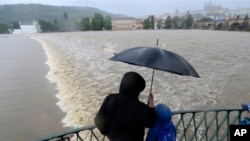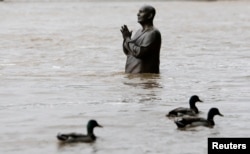PRAGUE —
Volunteers piled up sandbags to keep a swollen river from overwhelming the Czech capital's historic center on Monday after floods across central Europe forced factories to close, drove thousands from their homes and killed at least seven people.
Five people were killed at the weekend in the Czech Republic, where the flooding was the worst in a decade and a state of emergency was declared, while in Austria two people died and another two were missing.
The flooding, which also affected parts of Germany, Slovakia, Hungary and Poland, sent shares in reinsurers Munich Re and Hannover Re down by about 2.5 percent, with markets anticipating big claims from property owners once the waters recede.
Carmaker Volkswagen temporarily shut its plant in Zwickau, in the eastern German state of Saxony, because the flooding stopped workers reaching the factory.
In the center of the German town of Passau, people took off their shoes and rolled up their trousers to walk through the ankle-deep water. The last time central Europe saw similar floods was in 2002, when 17 people were killed in the Czech Republic, and damage estimated at 20 billion euros ($26 billion) was inflicted.
Officials in Prague, the Czech capital listed by the U.N. cultural agency as a World Heritage Site, said they did not anticipate the waters of the swollen Vltava river, which runs through the center, would reach 2002 levels.
But they were not taking any chances. They shut the metro system and, in streets near the river, soldiers put up metal fences - flood defenses ordered after the disaster 11 years ago. Elsewhere, volunteers built walls of sandbags.
Tigers at Prague zoo were tranquilized and moved out of an enclosure at risk from flooding.
Czech officials said the flood defenses in Prague should hold, but that the river level was likely to rise again on Tuesday morning. “The story is not yet over here,” said Czech Environment Minister Tomas Chalupa.
Cafe submerged
The Charles Bridge, a favorite spot for tourists which dates back to the 14th century, was closed. Tree trunks floated by in the muddy brown water. A riverside path, which is below street level, is usually populated with cyclists and people sitting at cafes, but it was under water on Monday.
“We left England yesterday and it was sunny and warm. We didn't expect this, we don't even have our raincoats,” said British tourist Alison Tadman, who came to Prague with her husband, Adrian, to celebrate her 47th birthday.
She and her husband were sheltering in a McDonald's restaurant. “We're pretty disappointed,” she said.
Some of the worst flooding was around the Danube river, which starts in Germany and snakes its way through countries including Austria, Slovakia and Hungary on its way to the Black Sea. The river was swollen by heavy rain at the weekend.
In Germany, the interior minister flew to the flood-hit regions on Monday and Chancellor Angela Merkel was preparing to go on Tuesday, government spokesman Steffen Seibert said.
How her government responds to the emergency could have some bearing on the outcome of a nationwide election in September.
Shipping was stopped on parts of the Danube and Rhine rivers in Germany, and along the whole Austrian stretch of the Danube, because of the high waters. The rivers are important arteries for moving grains, coals and other commodities.
Thousands of people living in low-lying areas in Austria and the Czech Republic had to be evacuated from their homes. In the Austrian town of Schaerding, a duck swam across a road intersection, past the gates of a flooded cemetery.
The death toll in Austria rose on Monday after a man who had been listed as missing was found dead in the province of Vorarlberg, local police said. The 58-year-old had failed to return home from a party on Saturday night.
In the Austrian city of Salzburg, 160 passengers were put up overnight in army barracks after the floods stranded their train. Austrian Foreign Minister Michael Spindelegger told reporters the situation in some areas was “very fraught.”
The risk on Monday was that the flood danger could follow the course of the Danube river downstream to other European countries along its route.
Workers put up flood barriers along the banks of the Danube where it passes through the Slovak capital, Bratislava, and police shut several roads.
“We are getting bad news from Germany and Austria. We have to do all we can to protect... the capital,” Slovak Prime Minister Robert Fico said.
In Hungary, whose capital Budapest is also built on the banks of the Danube, state media quoted Gyorgy Bakondi, head of the National Disaster Authority, as saying that 400 people were working on flood defenses.
He said water levels in the river could reach or even exceed the height seen in the record flooding in 2002.
Five people were killed at the weekend in the Czech Republic, where the flooding was the worst in a decade and a state of emergency was declared, while in Austria two people died and another two were missing.
The flooding, which also affected parts of Germany, Slovakia, Hungary and Poland, sent shares in reinsurers Munich Re and Hannover Re down by about 2.5 percent, with markets anticipating big claims from property owners once the waters recede.
Carmaker Volkswagen temporarily shut its plant in Zwickau, in the eastern German state of Saxony, because the flooding stopped workers reaching the factory.
In the center of the German town of Passau, people took off their shoes and rolled up their trousers to walk through the ankle-deep water. The last time central Europe saw similar floods was in 2002, when 17 people were killed in the Czech Republic, and damage estimated at 20 billion euros ($26 billion) was inflicted.
Officials in Prague, the Czech capital listed by the U.N. cultural agency as a World Heritage Site, said they did not anticipate the waters of the swollen Vltava river, which runs through the center, would reach 2002 levels.
But they were not taking any chances. They shut the metro system and, in streets near the river, soldiers put up metal fences - flood defenses ordered after the disaster 11 years ago. Elsewhere, volunteers built walls of sandbags.
Tigers at Prague zoo were tranquilized and moved out of an enclosure at risk from flooding.
Czech officials said the flood defenses in Prague should hold, but that the river level was likely to rise again on Tuesday morning. “The story is not yet over here,” said Czech Environment Minister Tomas Chalupa.
Cafe submerged
The Charles Bridge, a favorite spot for tourists which dates back to the 14th century, was closed. Tree trunks floated by in the muddy brown water. A riverside path, which is below street level, is usually populated with cyclists and people sitting at cafes, but it was under water on Monday.
“We left England yesterday and it was sunny and warm. We didn't expect this, we don't even have our raincoats,” said British tourist Alison Tadman, who came to Prague with her husband, Adrian, to celebrate her 47th birthday.
She and her husband were sheltering in a McDonald's restaurant. “We're pretty disappointed,” she said.
Some of the worst flooding was around the Danube river, which starts in Germany and snakes its way through countries including Austria, Slovakia and Hungary on its way to the Black Sea. The river was swollen by heavy rain at the weekend.
In Germany, the interior minister flew to the flood-hit regions on Monday and Chancellor Angela Merkel was preparing to go on Tuesday, government spokesman Steffen Seibert said.
How her government responds to the emergency could have some bearing on the outcome of a nationwide election in September.
Shipping was stopped on parts of the Danube and Rhine rivers in Germany, and along the whole Austrian stretch of the Danube, because of the high waters. The rivers are important arteries for moving grains, coals and other commodities.
Thousands of people living in low-lying areas in Austria and the Czech Republic had to be evacuated from their homes. In the Austrian town of Schaerding, a duck swam across a road intersection, past the gates of a flooded cemetery.
The death toll in Austria rose on Monday after a man who had been listed as missing was found dead in the province of Vorarlberg, local police said. The 58-year-old had failed to return home from a party on Saturday night.
In the Austrian city of Salzburg, 160 passengers were put up overnight in army barracks after the floods stranded their train. Austrian Foreign Minister Michael Spindelegger told reporters the situation in some areas was “very fraught.”
The risk on Monday was that the flood danger could follow the course of the Danube river downstream to other European countries along its route.
Workers put up flood barriers along the banks of the Danube where it passes through the Slovak capital, Bratislava, and police shut several roads.
“We are getting bad news from Germany and Austria. We have to do all we can to protect... the capital,” Slovak Prime Minister Robert Fico said.
In Hungary, whose capital Budapest is also built on the banks of the Danube, state media quoted Gyorgy Bakondi, head of the National Disaster Authority, as saying that 400 people were working on flood defenses.
He said water levels in the river could reach or even exceed the height seen in the record flooding in 2002.










